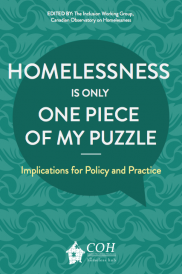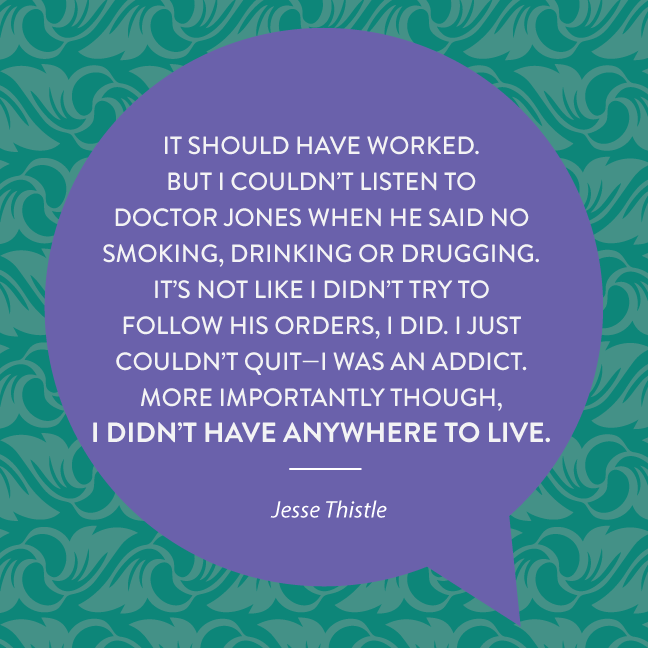This is an excerpt from the Homelessness is Only One Piece of My Puzzle: Implications for Policy and Practice book.
The kingdom of heaven suffers violence and violent men take it by force.
Matthew 11:12
Dead silence screamed danger. The frenzied squeaks of prison-issued blue deck shoes on sealed cement confirmed it. That was, of course, followed by wet smacks, fast pops, loud cracks and finally a dull thud. Whoever that guy was who lay crumpled and unresponsive on the range floor, he wasn’t conscious. His legs were seized straight, quivering uncontrollably and he had pissed and shit himself. Later, after the routine cell search and customary lock down, I heard that he had died en route to hospital. Apparently he stole a bag of chips from another inmate’s canteen, but who knew? Furthermore, who cared? This was prison justice: the thief got what he deserved according to us and society—at least that’s what I told myself to cope with the tragedy of this senseless act. All I knew was that I didn’t know anything and I didn’t see anything. I had only heard it. But I wouldn’t even tell the guards that much. I had to survive, and you did that by keeping your mouth shut and turning your head. But why was this my last and best option? Why would I put myself in this horrible violence and filth? The answer was simple: I did it to save my leg and my life.
Being a homeless person you’re matter out of place. You’re the grotesque, unwanted wildlife living in the urban-hinterland forests. Everyone stares at you, judges you and tells you to get a fucking job. The social distance that separates you from civilization also separates you from your own humanity. I know. I’ve lived it. Like some by-gone nomadic hunter-gatherer, you’re exposed to nature’s elements, starvation and disease. You’re on an endless sojourn to nowhere and when your already precarious wanderings are complicated by serious injury, often times you fade away and die, forgotten and alone. I wasn’t going out like that. I couldn’t let it end that way.
When the doctor’s assistant cut away the orange and black cast that surrounded my right shin and foot, she gasped. It smelled like Toronto during the summer garbage strike of 2009. Rotting meat and stale sweat filled the office. Her face told me the truth, even if she lied. “It looks all right. Excuse me one moment, Mr. Thistle, I have to get Doctor Jones.” She rushed out in haste. My leg had been throbbing before I even came to the fracture clinic, my toes had turned bluish grey-green, and the back of my cast was leaking a swampy crimson. I knew things were not good so I rushed my post-surgery checkup ahead six days. It had been four weeks since I fell out of my brother’s three-and-a-half-story apartment window (a causality of a drunken and drug-fuelled misadventure), and three weeks since the hospital had cast me out into the streets. My fall had shattered my right calcaneus (heel), destroyed my right upper ankle joint, broken my left scaphoid bone (wrist) and sprained my right wrist. The surgical team decided it was best to leave the wrists exposed so I could walk in crutches after they fixed the much more serious problem of my compressed right heel and ankle. They made the right decision, given my circumstances.
The lateral incision on the outside of my right foot was the typical way to fix my injury. Performed in a ninety-degree cut, it rode six inches along the back of the ankle and heel and six inches along the side of the foot. It should have worked. But I couldn’t listen to Doctor Jones when he said no smoking, drinking or drugging. It’s not like I didn’t try to follow his orders, I did. I just couldn’t quit—I was an addict. More importantly though, I didn’t have anywhere to live. Well, technically I did have a place to stay, my brother’s, but it hadn’t been cleaned properly in years. After my friend Alan stole the neighbour’s vintage bicycle, my brother kicked me out, cast and all. Understandably, he had to do what he had to do. If he had kept me he’d have been evicted by the landlord and we both would’ve been homeless. When I look back now, I figure that’s probably where I caught the infection that almost took my leg—and my life.
When the doctor and the nurse came in with masks on their faces, my stomach dropped. The doctor had in his hand a tool to take the staples out, another one that looked like wire cutters, lots of gauze, a baby-blue weeping tray and some medical tape. When I finally got the courage to look down at my exposed leg I nearly fainted. The black, puss-filled blood blister on the front of my ankle resembled a giant deformed pierogi. My foot and lower leg around the wound was swollen, green, red and greyish-yellow. When Doctor Jones took the staples out, the edges of the skin peeled back, exposing fat, muscle, bone and metallic hardware. The smell was horrid. “Not good, not good at all,” he remarked. “The surgery has been a complete failure. Your leg is infected and gangrene is setting in. I will clean it for now, cut away the necrotic skin and trim the bone, but you are at serious risk of losing your leg if you don’t take care of yourself.” With that, Doctor Jones set to work. At first I could handle the discomfort of him cutting my dead and infected flesh, but when I felt his full weight on my leg and then the sharp wet pop from his bone clipper I bellowed in agony, tears streaming down my face. My field of vision hallowed to pinpoints and then everything went glacier white. My hearing echoed and dulled, the voices of the doctor and nurse became distant, then inaudible. I was in shock. I vomited all over myself then passed out.
When I woke up my leg was again in a cast. I had on someone else’s clothes and felt really weak, but I was clean. The nurse then came in and told me I was free to go but I had to speak to Doctor Jones before I left. She had in hand a prescription for antibiotics, a suction pump machine to attach to my half-dead leg to improve circulation, as well as a schedule for an aftercare nurse who was to come and change my wound dressings twice a day. When I told the doctor I was staying at a homeless shelter, his face turned sullen. He knew, like I did, that it was a shithole of a place to recover in. I was used to staying there though. I had been homeless off and on for close to eight years before the drama with my leg. I had always been able to hold my own on the streets and in the shelter system, however, things weren’t like before. Now I was wounded and helpless and I couldn’t even walk, let alone defend myself. It didn’t matter. I couldn’t stay at the hospital. Unfortunately for me and others in my situation, hospitals aren’t in the business of letting people recover; they are in the business of making money. I guess the people who wrote the rules never figured that homeless people have crippling surgery too and need a safe place to recover, or maybe they did and didn’t care. Who knows? All I knew was I wasn’t welcome to stay.
 |
Read the rest of this story in the Homelessness is Only One Piece of My Puzzle: Implications for Policy and Practice book. Download it for free at: http://homelesshub.ca/onepieceofmypuzzle |


